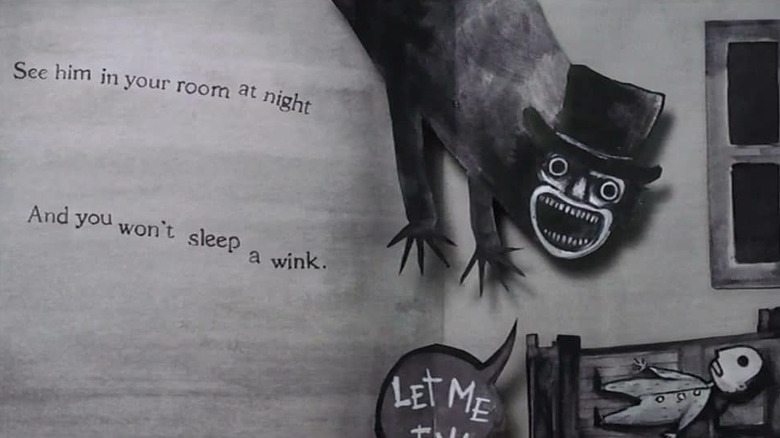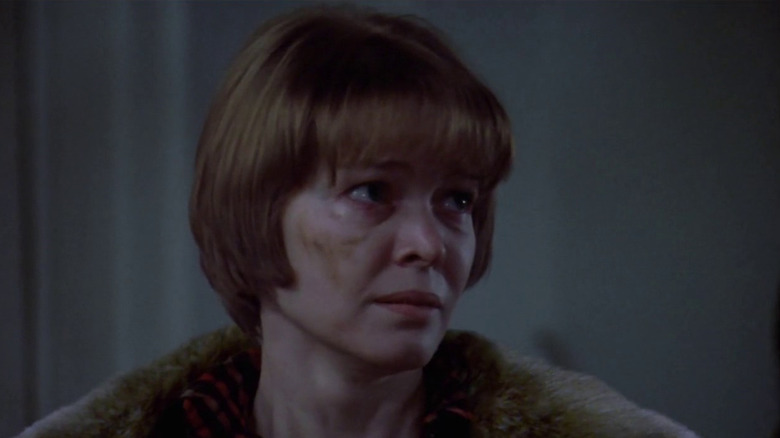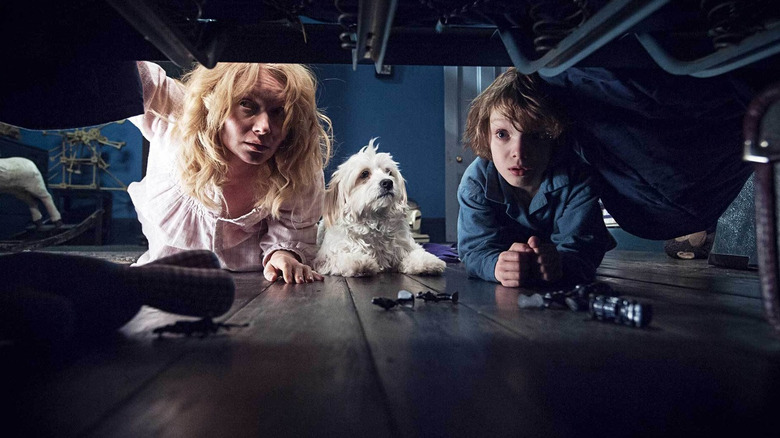William Friedkin Says This Is The Most Terrifying Movie He's Ever Seen
A sterling endorsement can propel a movie to success, and that holds especially true for horror movies. Sam Raimi's "The Evil Dead" got a seismic boost from a screening at the 1982 Cannes film festival where dark fiction maestro Stephen King sang its praises. Upon its release in 2014, another scrappy genre entry gained hype from a horror master when "The Exorcist" director William Friedkin gave due kudos to Jennifer Kent's motherhood meditation "The Babadook."
I've never seen a more terrifying film than THE BABADOOK.
It will scare the hell out of you as it did me.— William Friedkin (@WilliamFriedkin) December 1, 2014
"I've never seen a more terrifying film than THE BABADOOK," the caption reads, "It will scare the hell out of you as it did me."
It's fitting that Friedkin would appreciate the substance of "The Babadook." Kent's debut, a pivotal moment for Australian genre film, wraps social discomforts in a tidy genre package with atmosphere and dread-building tension. It's not hard to visualize the man who directed Ellen Burstyn in "The Exorcist" dropping his jaw at Essie Davis' performance as a mother stretched to her absolute limit and beyond. Let's take a look at the baba-duo of horror pictures and where they intersect.
Captain Howdy hates moms
Friedkin had achieved fame before "The Exorcist" came along in 1973; "The French Connection" cemented the filmmaker as one of the New Hollywood pack alongside the likes of Francis Ford Coppola and Martin Scorsese (and won him an Oscar for Best Director). An instant hit with sequels, prequels, and clouds of controversy surrounding it, the success of "The Exorcist" is such that Blumhouse has plans for a new entry in the rocky supernatural franchise, with the aim of gathering new and renewed fans the way that the studio has done with David Gordon Green's "Halloween" requels.
Based on William Peter Blatty's best-selling novel, the movie locates its physical struggle — a spiritual one for two clergymen — in the body of a young girl. Georgetown resident Regan MacNeil (Linda Blair) becomes possessed by the ancient demon Pazuzu (known to her as "Captain Howdy"), and her mother Chris (Burstyn) struggles to take care of her increasingly erratic daughter, turning to a pair of priests to rid the girl of her unwelcome occupant.
In the documentary "Leap of Faith," Friedkin credits the most tension-filled scene in his movie as not the exorcism itself, but a muted Bad Seed moment between Chris and Lieutenant Kinderman (Lee J. Cobb). Following the sudden, gnarly, mysterious death of family friend Burke Dennings (Jack MacGowran) just outside of Regan's bedroom, Kinderman calls on Chris as part of his investigation. The scene that ensues between them carries a pregnant pause in the space between the conclusion that the detective has arrived at and the terrible possibility that Chris is avoiding, that her daughter might be responsible for a man's death. Her love for her daughter remains unconditional, but the strains show themselves in Burstyn's increasingly histrionic delivery, even before the priests arrive with holy water. A family catastrophe glimpsed patiently, almost observantly, "The Exorcist" walked so that "Hereditary" could run.
Highlighting stigmas
Kent channels Friedkin's work not in awe of the supernatural, but in the colossal inadequacies of the secular and the human. As terminal experiments in parenthood, each pushes their effectively single mother characters to and beyond their breaking points, but the woman filmmaker adds an extra layer by casting doubts on the sanctity of motherhood itself. "The Babadook" centers around widow Amelia Vakan (Davis) and her young son Samuel (Noah Wiseman) as they navigate life under a single-parent household, which gets a shake-up with the arrival of a creepy book about a beaver hat-wearing figure named the Babadook. Delivering scares in-camera via stop-motion, the figure assumes the burden of Amelia's grief for her late husband, breaking her down with every passing moment.
Like Lynne Ramsay's "We Need To Talk About Kevin" and Franz & Fiala's "Goodnight Mommy," "The Babadook" gives voice to long-running taboos surrounding women who labor to relate with their children. Connection with Samuel is a foreign, arduous task for the well-meaning Amelia, who snaps at one strained moment of vulnerability and screams at her howling boy, "Why can't you be normal?!" Essie Davis, with vacant stares and quaking hysteria, burrows so deeply into the performance as to prompt concern for herself as much as the haggard parent she portrays. These waters are uncomfortable to tread, perhaps as uncomfortable as those Friedkin waded into in 1973 with images of a 12-year-old girl stabbing herself in the vagina with a crucifix and screaming blasphemies. But it's those unfamiliar, stigmatized waters that blanch audiences into conversations about the roles and rules and identities we have, and makes the horror so much more real.


